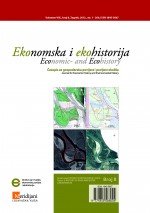Fish Instead of Fission: Industrial Expansion and Environmental Protest in Hamburg and the Lower Elbe Region Since the 1960s
Fish Instead of Fission: Industrial Expansion and Environmental Protest in Hamburg and the Lower Elbe Region Since the 1960s
Author(s): Frank ZelkoSubject(s): History
Published by: Društvo za hrvatsku ekonomsku povijest i ekohistoriju - Izdavačka kuća Meridijani
Keywords: Environmental History; Environmental Protest; Hamburg; the Lower Elbe Region
Summary/Abstract: The massive post-war expansion of the Hamburg Harbor, and the industry surrounding it, placed a tremendous amount of environmental stress on the Elbe River and its environs, including the city of Hamburg. Despite the adoption of various pollution abatement technologies, the massive amount of shipping traffic, combined with various industries along the banks of the Elbe, had a deleterious impact on the river. By the 1970s, fisherman began to catch severely deformed fish and health authorities warned against the consumption of seafood taken from the Elbe’s lower reaches. Swimming became unthinkable. In response to this environmental deterioration, local authorities attempted to ameliorate the problem through various technological developments, but their efforts were frequently stymied by various industries and their supporters in the government and the labor unions. The inability of the local government to combat the pollution in the Elbe, and the areas around it, led to the formation of a grass-roots environmental coalition that focused its energies on putting political pressure on industry and local authorities in Hamburg. A group made up of fishermen, scientists, and local environmental activists, began to engage in a variety of protest activities in the 1970s, from lobbying politicians to various forms of non-violent direct action, such as blocking the harbor, hanging banners on chimney stacks, and dumping barrels full of polluted water and deformed fish in front of the headquarters of the sanitary authorities and various industries they deemed responsible for the pollution. The author would like to thank the Gerda Henkel Stiftung for funding much of the research that went into this article.
Journal: Ekonomska i ekohistorija - Časopis za gospodarsku povijest i povijest okoliša
- Issue Year: 2012
- Issue No: 8
- Page Range: 29-44
- Page Count: 16
- Language: English

